Prevalent ecf cation - Study guides, Class notes & Summaries
Looking for the best study guides, study notes and summaries about Prevalent ecf cation? On this page you'll find 32 study documents about Prevalent ecf cation.
Page 3 out of 32 results
Sort by
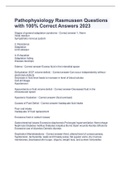
-
Pathophysiology Rasmussen Questions with 100% Correct Answers 2023
- Exam (elaborations) • 21 pages • 2023
- Available in package deal
-
- $12.39
- + learn more
Stages of general adaptation syndrome - Correct answer-1. Alarm Initial reaction Sympathetic nervous system 2. Resistance Adaptation Limit stressor 3. Exhaustion Adaptation failing Disease develops Edema - Correct answer-Excess fluid in the interstitial space Dehydration (ECF volume deficit) - Correct answer-Can occur independently without electrolyte defects Decrease in fluid level leads to increase in level of blood solutes Cell shrinkage Hypotension Hypovolemia or fluid volume ...
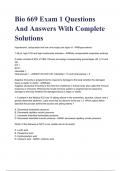
-
Bio 669 Exam 1 Questions And Answers With Complete Solutions
- Exam (elaborations) • 43 pages • 2024
-
- $12.99
- + learn more
Hypotension, tachycardia and low urine output are signs of - ANShypovolemia 7.36 ph, high CO2 and high bicarbonate indicates - ANSfully compensated respiratory acidosis If water consists of 60% of TBW. Choose and assign corresponding percentages (40, 5,15 and 20). ICF = ECF= Interstitial = Intravascular = - ANSICF=40; ECF=20; Interstitial = 15 and Intravascular = 5 Adaptive Immunity is programmed to respond to damage to the body whether the damaged tissue is septic or sterile - ANSF...
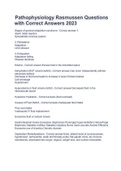
-
Pathophysiology Rasmussen Questions with Correct Answers 2023 latest
- Exam (elaborations) • 22 pages • 2023
-
- $7.99
- + learn more
Pathophysiology Rasmussen Questions with Correct Answers 2023 Stages of general adaptation syndrome - Correct answer-1. Alarm Initial reaction Sympathetic nervous system 2. Resistance Adaptation Limit stressor 3. Exhaustion Adaptation failing Disease develops Edema - Correct answer-Excess fluid in the interstitial space Dehydration (ECF volume deficit) - Correct answer-Can occur independently without electrolyte defects Decrease in fluid level leads to increase in...

-
Fundamental of Nursing II : Fluid, Electrolyte, and Acid–Base Balance ESSAY | Already GRADED A.
- Essay • 103 pages • 2021
-
- $10.99
- + learn more
Fundamental of Nursing II : Fluid, Electrolyte, and Acid–Base Balance Prepared by: Mahdia Samaha Kony 2021 Second semester 1 INTRODUCTION • In good health, a delicate balance of fluids, el ectrolytes, acids, and bases maintains the body. • This balance, or homeostasis, depends on multiple physiological processes that regulate fluid intake and output, as well as the movement of water and the substances dissolved in it between body compartments. 2 Body Fluids • Fluid means water that conta...
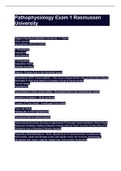
-
Pathophysiology Exam 1 Rasmussen University
- Exam (elaborations) • 21 pages • 2023
-
- $28.49
- + learn more
Stages of general adaptation syndrome 1. Alarm Initial reaction Sympathetic nervous system 2. Resistance Adaptation Limit stressor 3. Exhaustion Adaptation failing Disease develops Edema Excess fluid in the interstitial space 00:26 01:14 Dehydration (ECF volume deficit) Can occur independently without electrolyte defects Decrease in fluid level leads to increase in level of blood solutes Cell shrinkage Hypotension Hypovolemia or fluid volume deficit...
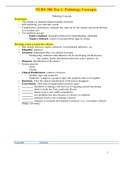
-
NURS 208 Test 1- Pathology Concepts | graded A
- Exam (elaborations) • 47 pages • 2021
-
- $10.99
- 1x sold
- + learn more
Pathology Concepts Homeostasis • The tendency to maintain balance/stability internally • Self-regulating, give-and-take system • Compensatory mechanisms: strategies that make up for the chan ges and return the body to its normal state • Two feedback systems: - Positive feedback: formation of blood clot while bleeding, child birth - Negative feedback: control of elevated blood sugar by insulin Histology: cause or reason for a disease • May include infectious agents, chemicals, environme...
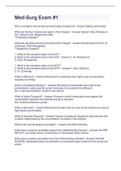
-
Med-Surg Exam #1(Fluid & Electrolytes, Acid-Base, Perioperative, Wound healing, Genetics & Immune, and Cancer)
- Exam (elaborations) • 15 pages • 2022
-
- $12.99
- + learn more
Who is at higher risk for fluid and electrolyte imbalance? Elderly and infants What are the four Cations and what is their charge? Sodium (Na), Potassium (K), Calcium (Ca), Magnesium (Mg) *Positively Charged* 00:17 01:08 What are the three Anions and what is their charge? Bicarbonate (HCO3), Cl (Chlorine), PO4 (Phosphate) *Negatively Charged* 1. What is the prevalent cation in the ICF? 2. What is the prevalent anion in the ICF? 1. K+ (Potassium) 2. PO4- (Phosphat...
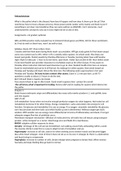
-
NUR 315 Pathophysiology (RATED A+) Study Guide. Download To Score An A
- Other • 115 pages • 2021
-
- $10.99
- + learn more
Pathophysiology What is the patho (what is the disease) how does it happen and how does it show up in the pt? (Not need know how to treat a disease process). Know power points (under units) mainly and book is just if something is not clear. Use Emedicine (they are same authors as WebMD). Can’t memorize, must understand the concept bc way say in class might not be as ask on test. Assignments- not graded, optional. ABG and EKG practice really evaluate how to interpret blood gasses and EKGs. Def ...
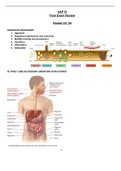
-
BIOS 256 FINAL EXAM REVIEW PACKET
- Case • 58 pages • 2021
-
- $12.99
- + learn more
A&P IV Final Exam Review Packet Ch. 24 DIGESTIVE PROCESSES 1. Ingestion 2. Digestion (mechanical and chemical) 3. Motility (mixing and propulsion) 4. Secretion 5. Absorption 6. Defecation GI TRACT AND ACCESSORY DIGESTIVE STRUCTURES GI TRACT INNERVATION • Autonomic NS o Parasympathetic NV (enhances digestion) o Sympathetic NV (inhibits or slows down digestion) • Enteric Nervous System o Submucosal plexus o Myenteric plexus ENZYMES orig...
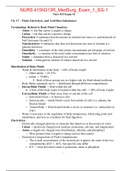
-
NURS 415 N313R_MedSurg_Exam_1_SG-1,100% CORRECT
- Exam (elaborations) • 59 pages • 2021
-
- $20.49
- + learn more
Ch. 17 – Fluid, Electrolyte, and Acid-Base Imbalances Terminology Related to Body Fluid Chemistry - Anion ion that carries a negative charge - Cation ion that carries a positive charge - Electrolyte substance that dissociates in solution into ions (i.e. and molecule of NaCl becomes Na and Cl) - Nonelectrolyte substance that does not dissociate into ions in solution (i.e. glucose and urea) - Osmolality a measure of the total solute concentration per kilogram of solv...

$6.50 for your textbook summary multiplied by 100 fellow students... Do the math: that's a lot of money! Don't be a thief of your own wallet and start uploading yours now. Discover all about earning on Stuvia


